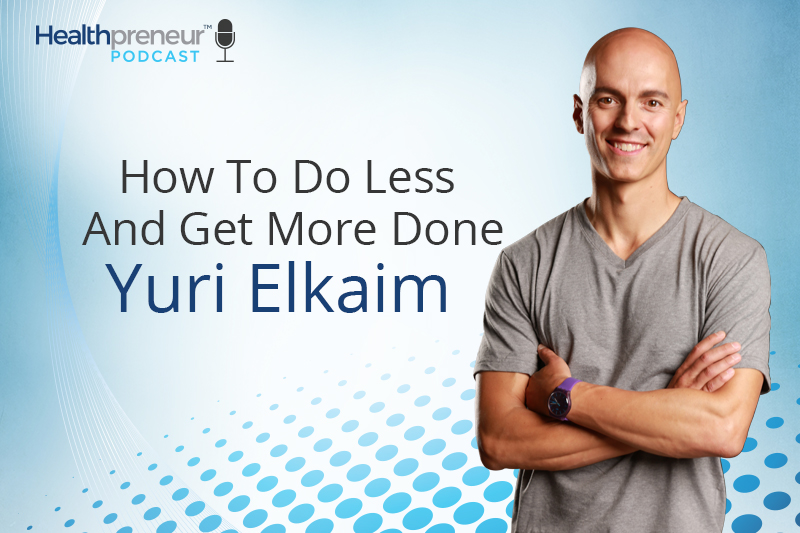How To Do Less And Get More Done

What’s up, Healthpreneurs? Welcome to the show! Today we’re going to talk about doing less and getting more done. Who doesn’t like the sound of that, right? It’s all about working smarter, not harder, so you can create more impact and make more money while putting in less hours.
Before I move on, I’ve got to put in a little disclaimer. If you’re just starting out or starting from scratch, you’ve got to put in the initial work. It won’t be easy and requires hustle, grit, and time. But once your business is running smoother and more predictably, you can – believe it or not – get your life back.
There are some easy ways to do this, including strategic scheduling, delegating, and discovering your “YOUnique Genius.” Of course, structuring your business in a way where it’ll operate without your constant overseeing is critical, and I’ll tell you how to do just that. If you’re at the point in your business where you’re ready to enjoy more freedom, tune in to find out what you can do to finally get your time back.
In This Episode I discuss:
1:00 – 4:00 – When you can step back, curate your time, and refine your lifestyle
4:00 – 9:00 – The importance of systems, processes, and teams
9:00 – 14:00 – Determining your “YOUnique Genius,” delegating, scheduling
14:00 – 16:30 – Documenting what you do now to step away later
16:30 – 18:00 – How our training helps set you up for success and freedom
Transcription
When I started Healthpreneur, it was me and myself pretty much. Then we brought on one person to help out with some project management stuff.
Initially what was happening is I was doing a lot of phone calls myself. I was doing enrollment calls. Four to six a day. That can take its toll. You’re kind of limited to what you can do energetically, but also in terms of freedom, in terms of travel and stuff such as that, I’m like, “Man, I don’t know if I can sustain this.”
When you can step back, curate your time, and refine your lifestyle
I ended up hiring some other people who I trusted, who were excited to work with us, and brought them on as enrollment coaches and now they’re results coaches for our clients as well, and they do all of the inbound phone calls.
I don’t do any phone calls anymore. We have a great team in place who are probably even better than I am on the phone.
I’ll be very honest with you. They’re amazing. Super helpful for our clients.
What’s that given me is that’s given me a lot more freedom back in my life. Because we have brought them on as coaches, yes, I’m spending more money on payroll, but it’s given me a lot more freedom back in my life.
This is what I’m talking about by doing less, I’m getting more done. I want to give you a couple little things to think about with that context. Okay?
Determining your “YOUnique Genius,” delegating, scheduling
The first thing you need to identify is what are your what I call “younique” genius activities.
I spell younique as Y-O-U, “younique” genius activities. For most people, there’s probably only one to three of them. For most business leaders, I believe one of our “younique” geniuses is creating content and sharing the message.
A podcast such as this is one of my “younique” genius activities. It’s my way of sharing my Kool-Aid, sharing a message. If you’re doing video, right? That’s your thing. These are things that you can’t really delegate that maybe somebody else could do, but maybe not as effectively as you. These are the things that you love doing, the things that energize you, the things that you can do forever.
That’s why for me talking into a microphone is very easy. It’s energizing. I can crank out a lot of this. I enjoy doing it, and I can bring my perspective to the market and serve our listeners in a very, very simple way.
This is an example of a “younique” genius activity. You have to identify what those things are for you. Speaking from stage is another one of my things. I love doing it, but as we grow that platform, I’m also thinking about how do I clone myself, how do I bring on other speakers to now share our company message, not just me who can travel around the world, right?
That’s the first thing is identifying those activities. Second is once you’ve identified that stuff, you have to delegate everything else eventually. Initially you’re going to wear all the hats. You’re going to learn how to do customer service and this and this and this and this, payments, blah, blah, blah, blah, blah. You kind of have to do that until you bring people on. When you do have a list of things that you don’t enjoy doing, the editing, the number tracking, whatever it is, that becomes a job description for maybe initially a VA to handle some low level stuff.
Then over time some more of the important tasks, whether it’s getting people to run your enrollment calls, right, having coaches working with you under your system to support your clients, these are things you can eventually delegate if you don’t want to do them yourself.
Get Your Most Important Work Done First Thing In The Morning
Third thing, just going back to a bit more personal productivity here, is block the first hour of your day to work on your most important project. I’ve got three kids and my magic time is between 6:00 and 8:00 in the morning when they’re really not up yet. I get up early. I get my most important work done.
The one or two things that are most important to move my business forward. It’s not reactive stuff. I’m not answering emails. It’s what is the project I’m working on, how can I move this forward? Even if the rest of the day was a complete shit show, at least those first two hours, it’s all good. I got the most important stuff done. Okay? The first hour or two in your day has to be devoted to the most important stuff.
Fourth is have kids. Well, if you’ve got kids, you know what I mean, but I’m not promoting any non-birth control type of activities here, but obviously having kids is very good from a productivity standpoint because what they do is they force you to create a hard stop.
If you don’t have kids, create a hard stop for yourself no matter what. For instance for me, I’m done working at 3 o’clock everyday because that’s when I pick up my kids from school. Then that’s it. If I have to finish up one or two little things at night, I’ll just hop on my computer for 30 minutes and finish things up. To the best of your ability, stick to that. This is the nice thing about having an office, which I don’t have. I mean I work from home, but if you have a physical office you go to, leave your stuff there. Don’t bring anything home, so when you’re done, you’re done.
Having that discipline is extremely helpful because again, what it does is it time compresses your day. It’s like you’re going on vacation. You have to get everything done before that time. Okay?
Scheduling Time Off
Number five is a little bit counterintuitive, but it’s something I really recommend is schedule time off in your calendar before anything else. When you’re planning out the next quarter or the year, block off when you’re taking a weekend off. Block off when you’re traveling. This is something that I do on an ongoing basis.
First and foremost, I know when I’m doing my workshops, when I’ve got my masterminds and I build my travel with that in mind first and foremost. We usually take a family trip in February. We do one in late November-December to get away from the cold. We’re typically traveling as a company anywhere from two to four times a year for a total of eight to 10 weeks. Then there’s obviously little trips that I’m taking for speaking or for other things like that. You want to block all that off in your calendar because number one, it’s exciting.
Number two, it gives you a really good sense of where things are happening and then you’ve got specific deadlines because you’re taking off for instance. It’s a really effective way to manage your calendar.
The importance of systems, processes, and teams
Finally, is putting systems in place that work on your behalf when you’re not working. Systems can be technology or people or both. If you’re not going to be here, what is the process? What’s something that you’re doing on a daily basis. How do you handle this specific issue that comes up? If a field payment comes through, how do you deal with that? Document that process.
Now you have somebody else that you can give that to who can deal with that issue step-by-step as you’ve laid it out when you’re not there. No matter where you are in your business, I think one of the most important activities, which is not a lot of fun to do to be very honest, is to document everything you do.
How do you upload a video to YouTube? How do you create a post for Instagram, or how do you deal with this specific customer service thing, or what is the onboarding sequence look like for new clients? Document all of that. Create a playbook for your business.
Because the more you do that, you’ll very quickly realize that you’ve now “McDonaldized” your business. You now have an operations manual for the way your business works. When people come in to work with you, you’re like, “Okay. Cool. Here you go. You run chapter one. You run this and then here are the things for you to work on. Here’s the step-by-step.”
I’m telling you this will give you more freedom than you can ever think possible. I would honestly spend maybe one hour a week just documenting your processes and just block it off in your calendar. Friday morning 11 o’clock process documentation.
Look at one or two things you’re doing and document the whole thing. Here’s the first thing I do then this, then this, then this. In the long-term, a year from now to five years from now, having that done will give you immense freedom because either you can turn to that very easily for a quick reference or more importantly, somebody else can run that for you.
How our training helps set you up for success and freedom
That is how you do less and get a lot more done. That is how you build a business that gets back to fulfillments and profit and impact instead of working yourself into the ground and burning out. Hope you’ve enjoyed this one.
If you want more support and the exact strategy that we use to help our clients really build very profitable businesses with honestly less than a dozen hours of work per week once they have built out their initial pipeline, right, there’s obviously as I mentioned a little bit of time to build things out, but once that’s done, how can you build a high six-figure business with I’d say about 10 hours a week.
If you want to do that, then we can show you exactly how to do that inside of our 7-Figure Health Business Blueprint training.
It’s over at HealthpreneurGroup.com/training. It’s a free webinar.
Go through it and you’ll see exactly what we do in our business and exactly how we help our clients get those types of results without grinding themselves into a pulp.
If that’s of interest to you and you enjoyed what we’re talking about here, such as doing less and getting more done and serving your clients at a higher level and making more money, having more freedom, then this is for you.
Check it out today. Thank you so much for joining me. Hope you have an amazing one and continue to go out there. Be great. Do great. I’ll see you next time.
If you enjoyed this episode, head on over to iTunes and subscribe to Healthpreneur™ Podcast if you haven’t done so already.
While you’re there, leave a rating and review. It really helps us out to reach more people because that is what we’re here to do.
What You Missed
In our last episode, we did our very first client spotlight with the amazing Amanda Tress.
Amanda is the founder of a program called “The Faster Way to Fat Loss,” which has spread like wildfire across the internet over the past 18 months.
Amanda started from humble beginnings and hustled her way to the top. She is now doing a million dollars per month with her fitness and nutrition-based program for women, and has learned from the growing pains that come with standardizing and marketing her product.





